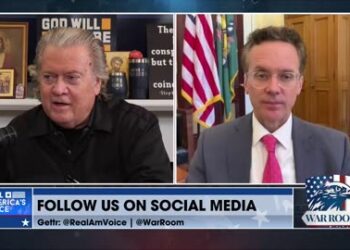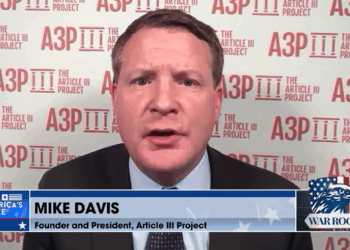Richard Barris, known for his critical stance on mainstream polling practices, recently scrutinized how media outlets and pollsters may skew public perception. His analysis sheds light on the often opaque political polling and media reporting world.
“The first way you can manipulate a poll if you so choose… would be to oversample, for example, the Democrats. There are maybe timing issues where you go out with a poll after some transient event has happened.They were afraid, Peter, of the narrative. So here they are with the Trump plus one poll, and they withhold it for two weeks because they’re afraid to go against a media narrative. ABC News is using the 538 aggregator to create false impressions of momentum and Harris support that doesn’t exist. They got Ipsos, basically replacing a guy who was giving them honest numbers because they didn’t like the honest numbers” Barris told Navarro.
Barris criticized the portrayal of Kamala Harris’s recent interview, describing it as a “disaster” that failed to address substantive issues. He pointed out Harris’s evasion on topics like her stance on fracking, which he believes is crucial given her administration’s energy policies.
According to Barris, the interview was an attempt by the media to create a positive narrative despite Harris’s poor performance. He argued that such coverage indicates a broader issue where media outlets, rather than providing objective reporting, engage in “spin” to bolster the administration’s image.
One critical point Barris raised was the potential manipulation of poll results. He explained that media outlets and polling organizations often use oversampling or timing manipulations to skew results. “It’s not just about the sample size; it’s about who’s in the sample and when the poll is conducted,” Barris asserted. He highlighted how organizations like ABC News and 538 might present polls in a way that favors Democrats, pointing to what he described as deliberate manipulations to align with partisan narratives rather than reflecting genuine public opinion.
Barris also addressed the issue of polling inaccuracies and their implications for voters. He noted that many polls may be designed to reflect a desired outcome rather than an actual snapshot of public sentiment. “Voters need to be aware that not all polls are created equal,” Barris warned. He emphasized the importance of understanding that media portrayal of polling data can be misleading, urging voters to critically evaluate the sources of polling information and consider the possibility of bias.
Barris discussed the political impact of RFK Jr.’s exit from the presidential race. He suggested that a substantial portion of RFK Jr.’s supporters might shift their allegiance to Trump, which could significantly alter the electoral dynamics. Barris viewed this as a sign that traditional polling may fail to capture shifts in voter sentiment accurately.
Barris’s insights underscore the necessity for voters to approach media and polling data with a critical eye. His critique of current media practices highlights how distorted or manipulated reporting can influence public perception and electoral outcomes. By understanding these dynamics, voters can make more informed decisions and navigate the complexities of modern political reporting.
Watch this two part interview for the full context of Barris’s comments and observations:






Barris is awesome 💯
Thanks for the feedback, Michael. Barris is a totally awesome addition. I agree. Thanks for reading.